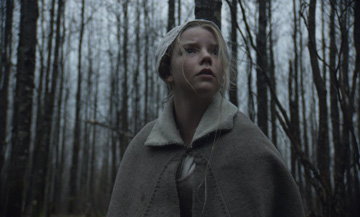The 400-Word-Review: The Witch
By Sean Collier
February 25, 2016
The Witch, a period horror film from first-time director Robert Eggers, is so stunningly dark that the Satanic Temple, declaring it to be “a transformative Satanic experience,” has decided to host screenings in four U.S. cities.
I’m a little fuzzy on what exactly constitutes a transformative Satanic experience. (And it should be noted that the Satanic Temple is the more rational, humanist branch of Satanism; they do not believe in an actual supernatural dark lord, according to their website.) But I’m unsurprised at the association; The Witch is one of the bleakest films I can recall and serves as a widespread indictment of organized religion.
It’s also a fairly phenomenal movie.
Set in the 1600s, The Witch opens on William (Ralph Ineson) the patriarch of a small family, standing accused of witchcraft in a Puritan village. Outraged, he vows to leave the town to prove his disinterest in witching the locals. William leads his wife Katherine (Kate Dickie) and five children into the wilderness to establish a homestead and a farm; they get on their feet, but have a tough time producing arable crops.
Within weeks, the family’s infant son vanishes while in the care of eldest daughter Thomasin (Anya Taylor-Joy). Katharine is plunged into a deep despair while William begins to fray under the pressure; the children grapple with minor temptations. As more and more goes awry, however, the accusations of dark dealings begin to fly — with angry, post-pubescent Thomasin as the most likely target. (Taylor-Joy’s performance, full of restrained fire and adolescent frustration, may well be counted among the year’s best when 2016 draws to a close.)
Eggers also wrote the film, drawing some of its dialogue and most of its content from period sources. This lends an authenticity missing from many depictions of the age — most of which are more than happy to place 21st century English in the pilgrims’ mouths — and allows Eggers to indulge in a more literary, memorable style than would otherwise be expected in the genre.
Notably, his direction is truly impressive for a freshman; Eggers’ style is languid, deliberate and unnerving, drawing terror out of suspense and uncertainty. He is happy to make the viewer uncomfortable, a fact that becomes even starker when The Witch approaches its climax. Many will struggle with the film on several levels, but those sturdy enough for it will be impressed.
My Rating: 9/10
Sean Collier is the Associate Editor of Pittsburgh Magazine and a member of the Broadcast Film Critics Association. Read more from Sean at pittsburghmagazine.com/afterdark




